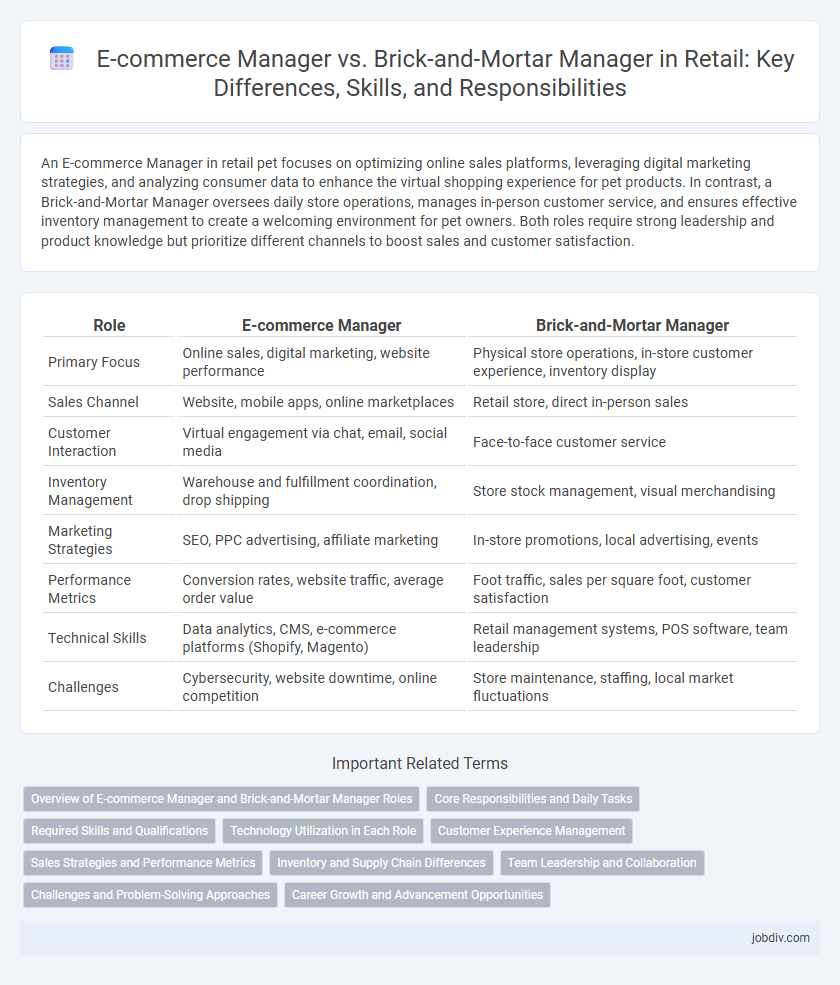An E-commerce Manager in retail pet focuses on optimizing online sales platforms, leveraging digital marketing strategies, and analyzing consumer data to enhance the virtual shopping experience for pet products. In contrast, a Brick-and-Mortar Manager oversees daily store operations, manages in-person customer service, and ensures effective inventory management to create a welcoming environment for pet owners. Both roles require strong leadership and product knowledge but prioritize different channels to boost sales and customer satisfaction.
Table of Comparison
| Role | E-commerce Manager | Brick-and-Mortar Manager |
|---|---|---|
| Primary Focus | Online sales, digital marketing, website performance | Physical store operations, in-store customer experience, inventory display |
| Sales Channel | Website, mobile apps, online marketplaces | Retail store, direct in-person sales |
| Customer Interaction | Virtual engagement via chat, email, social media | Face-to-face customer service |
| Inventory Management | Warehouse and fulfillment coordination, drop shipping | Store stock management, visual merchandising |
| Marketing Strategies | SEO, PPC advertising, affiliate marketing | In-store promotions, local advertising, events |
| Performance Metrics | Conversion rates, website traffic, average order value | Foot traffic, sales per square foot, customer satisfaction |
| Technical Skills | Data analytics, CMS, e-commerce platforms (Shopify, Magento) | Retail management systems, POS software, team leadership |
| Challenges | Cybersecurity, website downtime, online competition | Store maintenance, staffing, local market fluctuations |
Overview of E-commerce Manager and Brick-and-Mortar Manager Roles
An E-commerce Manager oversees online retail operations, focusing on digital marketing, website usability, online customer experience, and data analytics to drive sales through virtual platforms. A Brick-and-Mortar Manager handles in-store activities, staff management, inventory control, and customer service to enhance physical shopping experiences. Both roles require strategic planning and leadership but cater to distinct retail environments leveraging different operational tools and performance metrics.
Core Responsibilities and Daily Tasks
An E-commerce Manager oversees online sales platforms, optimizing user experience, managing digital marketing campaigns, and analyzing web traffic data to boost online revenue. A Brick-and-Mortar Manager handles in-store operations, staff supervision, inventory control, and customer service to ensure smooth daily retail functioning. While the E-commerce role focuses on digital strategy and technology integration, the Brick-and-Mortar Manager emphasizes physical store management and face-to-face customer interactions.
Required Skills and Qualifications
E-commerce managers require expertise in digital marketing, SEO, data analytics, and platform management to optimize online sales channels and enhance user experience. Brick-and-mortar managers need strong interpersonal skills, inventory control knowledge, and experience in staff supervision to maintain store operations and customer satisfaction. Both roles demand strategic planning abilities and a solid understanding of retail principles, but digital proficiency is paramount for e-commerce while hands-on management is critical for physical stores.
Technology Utilization in Each Role
E-commerce Managers leverage advanced technologies such as data analytics, AI-driven personalization, and omnichannel platforms to optimize online customer experiences and streamline digital operations. Brick-and-Mortar Managers utilize point-of-sale systems, inventory management software, and in-store analytics to enhance physical store efficiency and customer engagement. Both roles require technological proficiency, but E-commerce Managers prioritize digital tools for virtual sales growth while Brick-and-Mortar Managers focus on technology that supports in-store sales and operations.
Customer Experience Management
An E-commerce Manager leverages digital analytics and personalized online tools to enhance customer experience, optimizing website usability, checkout processes, and targeted promotions. In contrast, a Brick-and-Mortar Manager focuses on in-store ambiance, staff training, and direct customer interactions to create a tangible, sensory shopping environment. Both roles prioritize customer feedback but employ distinct strategies aligned with their specific retail channels to drive satisfaction and loyalty.
Sales Strategies and Performance Metrics
E-commerce Managers prioritize digital marketing channels, conversion rate optimization, and real-time analytics to enhance online sales performance, leveraging metrics such as click-through rates, bounce rates, and average order value. Brick-and-Mortar Managers focus on in-store experience, inventory management, and customer foot traffic, monitoring sales per square foot, average transaction value, and customer retention rates. Both roles tailor sales strategies to their operational environments, using distinct performance indicators to drive revenue growth and customer engagement.
Inventory and Supply Chain Differences
E-commerce managers leverage advanced inventory management software and real-time data analytics to optimize stock levels and predict demand fluctuations, enabling rapid adjustment to consumer trends across multiple online platforms. In contrast, brick-and-mortar managers rely heavily on physical stock audits and localized supply chain logistics, often facing challenges with shelf space limitations and in-store inventory discrepancies. Fulfillment speed and last-mile delivery coordination are critical for e-commerce, whereas brick-and-mortar focuses on in-store replenishment and vendor relationship management to maintain product availability.
Team Leadership and Collaboration
An E-commerce Manager leads cross-functional teams including digital marketing, UX design, and IT to optimize online customer experiences and drive sales growth. Collaboration focuses on integrating data analytics, logistics, and customer service to enhance platform performance and streamline operations. In contrast, a Brick-and-Mortar Manager directs on-site staff such as sales associates and inventory teams, emphasizing in-person customer engagement, visual merchandising, and store-level problem solving.
Challenges and Problem-Solving Approaches
E-commerce Managers face challenges such as website downtime, cybersecurity threats, and managing digital marketing campaigns, requiring data analytics and agile problem-solving to optimize user experience and conversion rates. Brick-and-Mortar Managers contend with inventory management, staff scheduling, and in-store customer engagement, relying on real-time decision-making, conflict resolution, and physical space optimization to drive sales. Both roles demand strategic adaptation to evolving consumer behaviors but leverage distinct tools and solutions tailored to digital versus physical retail environments.
Career Growth and Advancement Opportunities
E-commerce Managers capitalize on the rapid expansion of digital retail, with career growth fueled by proficiency in data analytics, SEO, and omnichannel strategies, often advancing to roles like Digital Marketing Director or Chief E-commerce Officer. Brick-and-Mortar Managers develop expertise in in-store operations, customer service, and team leadership, with advancement opportunities leading to Regional Manager or Retail Operations Director positions. The digital shift in retail drives higher demand and accelerated career trajectories for E-commerce Managers compared to traditional retail roles.
E-commerce Manager vs Brick-and-Mortar Manager Infographic

 jobdiv.com
jobdiv.com